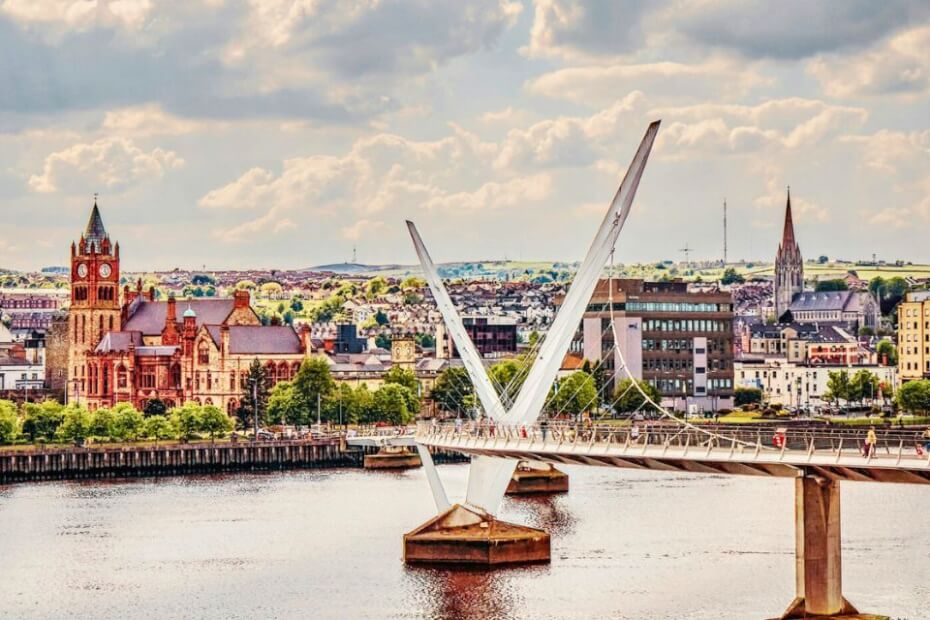
Economy Minister Conor Murphy has yet again voiced significant concerns about the impact of the United Kingdom’s (UK’s) new Electronic Travel Authorizations (ETA) on Northern Ireland’s tourism.
Murphy was asked about the impact of the ETA on Northern Ireland’s tourism at Stormont during the first week of July.
He, along with Derry’s tourism sector, believes that the ETA could harm the region’s tourism industry, particularly in Derry.
“There is a general sense across all the tourism organizations that it is not good news,” Murphy told Derry Journal.
The Economy Minister said they “have made representations already” to the UK government but “did not receive much” response.
“There is a recognition across the Executive that the scheme is not good for tourism,” he added.
Murphy further stressed, “It is certainly not good for our economic growth, given the potential that we have for economic growth through tourism.”
He plans to suggest a proposal for the tourism industry to tackle Northern Ireland’s ETA concerns, which will be presented collectively to the new British government.
The ETA and Northern Ireland
The UK ETA is a new travel requirement that will be required for all non-visa nationals visiting the UK.
It is already mandatory for UK-bound travelers from Qatar, Bahrain, Jordan, Kuwait, Oman, Saudi Arabia, and the United Arab Emirates (UAE).
By 2024, the Home Office plans to implement the digital travel permit for all who can visit the UK without a visa.
Non-visa visitors, including tourists visiting Northern Ireland, must apply for an ETA before coming to the UK.
For instance, non-visa visitors will need an ETA to cross the open land border from Donegal in the Republic of Ireland to Derry in the UK.
This measure aims to enhance border security but has raised alarms among tourism advocates.
However, the Home Office admitted to a UK Parliament Committee that enforcing the ETA in Northern Ireland will be a “challenge.”
The Common Travel Arrangement (CTA) ensures freedom of movement between the UK, the Republic of Ireland, and the Crown Dependencies.
Those with Irish passports are exempt from presenting an ETA when traveling to the UK.
Non-visa nationals who are legal residents of Ireland traveling to the UK via the CTA are also exempt from the ETA scheme.
However, there are no routine immigration controls on journeys within the CTA.
This includes the open land border between Ireland and Northern Ireland.
Tourists who require an ETA may cross the open land border without knowing they need the requirement and may break the law unknowingly.
Tony Smith, former UK Border Control Director, pointed out the same potential loophole in enforcing the ETA system.
ETA’s impact on Northern Ireland’s tourism
Derry, a city known for its rich history and cultural heritage, relies heavily on tourism, as do many other towns in Northern Ireland.
Local tourism officials and business owners have widely criticized the introduction of the ETA, fearing it will deter potential visitors.
Murphy previously expressed concerns that introducing the ETA would exclude Northern Ireland’s tourist destinations and attractions from tours operating in the Emerald Isle.
He added that independent travelers might also opt to avoid visiting Northern Ireland due to the added requirement and cost.
The Economy Minister stressed that “seamless all-island travel” with the Republic of Ireland is vital to Northern Ireland’s tourism success.
Odhran Dunne, the Chief Executive of Visit Derry, also said communicating the new travel requirement would be challenging.
He stated that the ETA is a “huge concern” as it is “another hindrance to travel” and promoting Derry tourism.
The Causeway Coast and Glens Borough Council shared the same fears, saying that the ETA would create a “major barrier to growth” in Northern Ireland’s tourism.
It stated, “This is not sustainable and must be addressed as a matter of high priority.”
Almost 70 percent of tourists visiting Northern Ireland come via the Republic of Ireland.
Traveling to Northern Ireland by air presents challenges due to limited competition in the market.
This is why Northern Ireland’s independent and group visitor traffic relies heavily on Dublin’s gateways.
UK government’s perspective
The UK government maintains that the ETA is necessary for improving the country’s border security.
Still, critics believe the negative impact on Northern Ireland’s tourism was not fully considered in the policy.
Dunne and the Northern Ireland Tourism Alliance had rallied for ETA exemptions for tourists traveling from the Republic of Ireland.
The alliance had suggested tourists visiting Northern Ireland only for days or up to a week should be exempted from the ETA.
However, the British government has repeatedly refused ETA exemptions for tourists visiting Northern Ireland via the Republic of Ireland.
Such an exemption “undermines our efforts to strengthen the security of the UK border and keep people safe,” said the Home Office
Northern Ireland Economy Minister Murphy and other local leaders call on the UK government to reevaluate the implementation of the ETA.
They recognize the need for security, but it should not come at the expense of our tourism industry.
Looking Ahead
The introduction of the Electronic Travel Authorisation poses a real risk and a significant challenge for Northern Ireland’s tourism industry.
With strong opposition from local officials and businesses, the future of tourism in Northern Ireland hangs in the balance.
The call for a balanced approach that ensures security while promoting tourism is louder than ever.
As the new UK government takes office, the future of the UK ETA implementation in Northern Ireland remains uncertain.
The hope is that continued dialogue between local leaders and the government will lead to adjustments supporting security and tourism growth.

